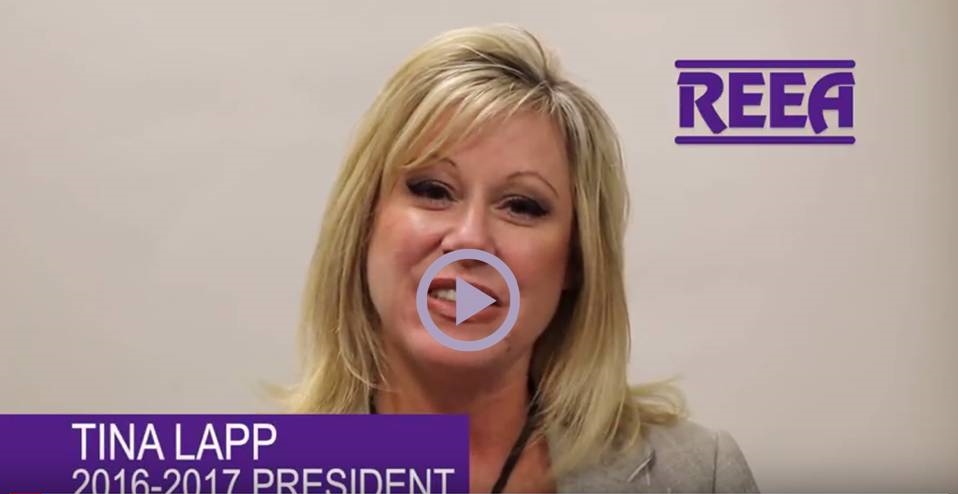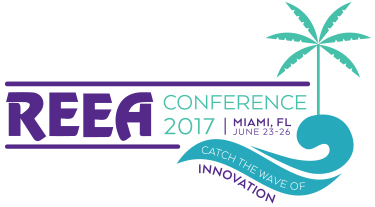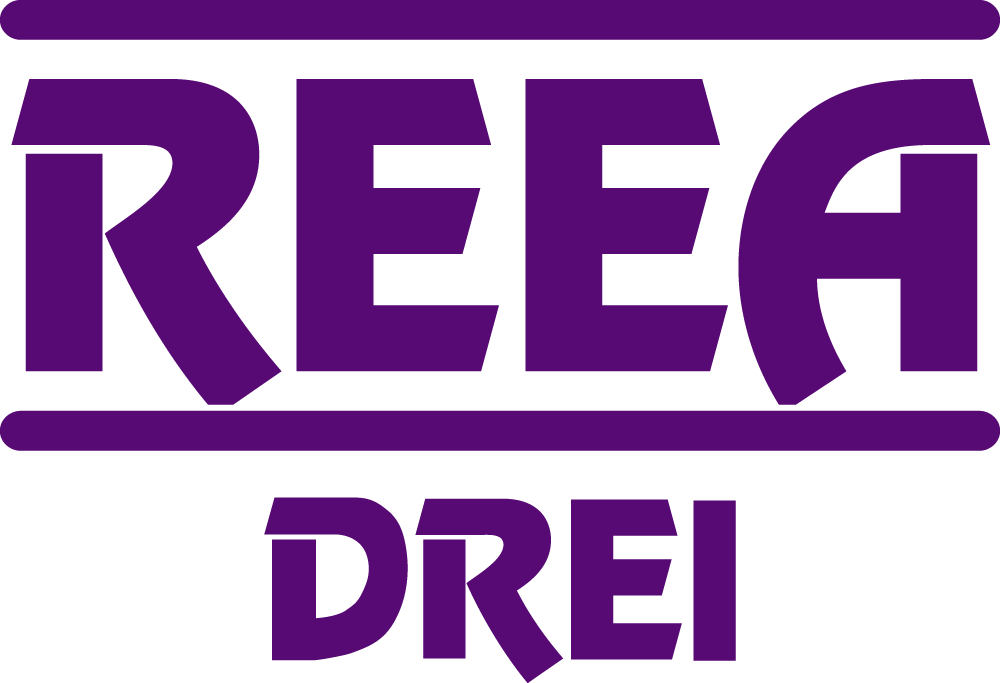Hi this is Tina your 2016-2017 President of REEA! It was great seeing you at the REEA conference, for those of you that joined us in Denver Colorado. I hope by now everyone is back home settled in their day to day activities. I’m excited to announce our committees’ are in full swing and I am so impressed by the involvement of everyone in these committees - however if you have not yet joined a committee it’s not too late! Visit our website at www.REEA.org/MembersOnly, click on the Committees link and sign up to be on the committees. While you are there remember to take a look at the updates that our communications and marketing committee have already made to the website and don't forget to update your personal Profile. Also if you would go to Facebook and like the REEA page and make sure you share it with others in the industry, we can build up our membership and share all of the great things coming up at our 2017 Annual REEA Conference at the Marriot Miami Biscayne Bay in Florida. I look forward to seeing you there!
CATEGORY: REEA
Greetings from Your 2016-2017 REEA President
Top Issues in Real Estate Education Today
Greetings from the communications committee! Our REEA Members have identified some of the top issues in real estate education today and would like us to highlight these topics in our blog over the next few months. Having this as our current blog focus we hope it will not only add value to your day to day business, but hope to gain some participation from you. If there’s a topic you don’t see in our list and/or you are interested in writing a blog entry, please email it to Allison Willford with REEA Blog in the subject line.
. . . Through the Eyes of Regulators
- How to improve instructor performance?
- What are proven methods of effective adult teaching skills?
- Provide a laundry list of active teaching examples
- Using acronyms for optimal student retention
- Stop fighting the way your students learn and teach the way your students need you to teach. Not just teaching the way you were taught
- Coming Soon
- Pocket listings
- Advertising with social media
- Regulation of business models like Airbnb
- Competency of new agents
- Lack of supervision by BICs
- The biggest complaint I hear as a regulator is that the teacher did not know the subject matter very well
. . . Through the Eyes of the REEA Communication Committee
- Retraining the instructor to understand different ways of learning among generations; teaching to/with more than one skill level in the same class; multigenerational classes
- Consumer education (the client) – how to teach the student to educate the client; Consumer education (the public) – how to teach the student to educate/inform the public
- Teaching required courses to a variety of specialties at the same time (residential plus property management plus commercial for example)
- Making required topics informative AS WELL AS FUN, entertaining, and interesting
- Lack of affordable housing (starter homes are often unaffordable for most housing “beginners”)
- Increasing wealth and income gap among buyers (student loan debt and stagnating wages exacerbating the trend)
- Lack of professionalism among agents a growing trend
- Political inertia – regardless of political proclivities, acrimonious emotions between parties prevent real work being accomplished
- Demographic shifts – millennials and baby boomers competing in same housing markets (baby boomers win due to wage and asset advantages)
- Trend toward urbanization – walking distance appealing
- Having to teach “required courses” which have minimum level of competency expected, in a way that will meet our personal goals to increase competency for our students
- Education level of students (different requirements from different states)
- Incorporating tools in the classroom which speak to all learners – visual, auditory and kinesthetic
- Affordability of homes
- Lender qualification of buyers
- Infrastructure – roads, light rail, buses, trains, etc.
- Change of the FHA Scope of work - NAR did a good article from our DC meetings
- Methamphetamine and real estate, FHA has a just started addressing, we have a lot of concern in upstate New York
- Trying to keep up with changing practices (use of licensed assistants and getting states and regulations adopted and written and implemented, for example)
- Getting wrapped around the axel between what law requires versus what ethics would require and how to change statues and regulations where necessary and if necessary it is still disclosure, disclosure, disclosure and getting licensees (agents) to abide by the law
Don't forget! If there’s a topic you don’t see in our list and/or you are interested in writing a blog entry, please email it to awillford@hondros.com with REEA Blog in the subject line.
Americans with Disabilities Act - New Regulations Coming Soon
We are all familiar with the Americans with Disabilities Act and how it impacts physical locations. If you have wondered why this doesn’t apply to the web - Get ready! New regulations are on the works for 2018, you should encourage your company and your network to get a head start or risk hefty legal bills.
This article has been provided by REEA Member Karel Murray, DREI as she felt “It is an important topic when presenting to your Real Estate community as they will certainly be marketing to the masses that include handicap/disabilities”. Karel goes on to say, “Particularly, with businesses that are public accommodating, government run or such will have the closest scrutiny when this becomes more defined and mandated. For now, the WWW has been an evolving system with best practices coming to light as interest and use have grown and continues to grow.”
Read the article linked here, Website accessibility regulations delayed until 2018 but businesses should not table the issue until then for more information, share your thoughts with your fellow REEA members and how your company is protecting themselves.
"5 Big Trends That Will Change Education in 2017" courtesy of Dearborn Real Estate Education
Congratulations to REEA Directors Theresa Barnabei and Bruce Moyer, DREI who were recently interviewed by REEA Members at Dearborn Real Estate Education in an article “5 Big Trends That Will Change Education in 2017”.
Click here to view the article and then join Theresa and Bruce as the present two (2) – 1 day Instructor Development Workshops, “Taking Your Instruction to New Heights” IDW #1 and IDW #2 during the 2017 Annual REEA Conference June 23 and 26, 2017 in Miami, Florida.
In Real Estate, Knowledge is Power
REEA is excited to announce that we recently participated in Mediaplanet USA’s Real Estate & Remodeling campaign where we united with likeminded industry leaders to connect professionals and consumers within the real estate and remodeling space to inspire education, growth and business efficiency through best practices in customer satisfaction, brand building and sustainability. The campaign was distributed through USA TODAY on September 19th, 2017 and is published online.
In Real Estate, Knowledge is Power
Like most professions, the real estate industry is constantly changing. That’s why the real pros are always one step ahead of the game. Read full article here.
What I've Learned Since I've Been Teaching
Listen to REEA Member Travis Everette as he shares his tips and tools on;
- Don't Blame The Fish
- Tools in the Classroom
- Overcoming Your Own Mistakes
- Keeping Your Audience Engaged
Click here to see this valuable video that will help you in the classroom!
REEA Member and DREI Candidate, Travis Everette is the Director of the Pan School of Real Estate in Raleigh, North Carolina which he founded in 2012 as well as the Broker in Charge of a 110 agent residential real estate brokerage. He has been instructing real estate courses in North Carolina since 2009 and is the current recipient of the North Carolina Real Estate Commission's Larry Outlaw Excellence in Education award and the 2017 NCREEA Educator of the Year.
Travis Everette | 252-916-9549 | traviseverette@gmail.com
A Day in the Life of an Ed Director
A Day in the Life of an Ed Director
Fight traffic, find a less congested short cut and arrive at the office by 8:30am, craving coffee. Wonderful...Someone made coffee and it’s ready. Oh joy.
Stop by my assistant’s desk to see the day’s calendar. We have a great facility with three formal classrooms that run 9:00am to 10:00pm, good only 4 classes today. One in the morning, one in the evening and one all day. With about 100 students in the building this morning, I better make sure to be available during the breaks and at lunch. With luck, most concerns will be general and I’ll escape the angry member who’s license is expiring next week and we don’t have enough courses for her to complete her requirements. Thank heaven I took the REEA break out session “Dealing With Difficult People” at one of the conferences. The session is repeated occasionally and I really need a refresher SOON.
8:45am - Direct traffic to the two classrooms; make sure the instructors have all that they need. Uh, oh, one of the instructors isn’t here yet. Keeping finger’s crossed that all the students and the instructor get here on time. I ask my assistant to check the traffic report to see if there are any trouble spots causing delays. Nothing beyond the ordinary rush hour traffic. Clock is ticking and I’m missing one instructor and the other class has lots of unsigned signatures on the attendance sheet.
9:00am - Still no instructor. I go into the class and tell them the instructor is delayed and let’s discuss programs they hate, loved and new topics they would like to hear about. Soon the instructor arrives – a fender-bender in front and it took a bit before the cars were moved out of traffic area. Thank heavens, since I cannot sub for this instructor - no expertise in his topic. Now I can get a desperately needed second cup of coffee.
9:20am - I go back into each class, waive the attendance sheet and declare anyone coming in after I leave, cannot get CE credit! Once I had a student come into my office an hour late demanding that I give her CE credit. Told her I can’t without permission from the real estate commission. She said I could. I said “So you want me to give you three hours credit for a class you attended for less than two hours?” She answered “yes”. My response was “You want me to lie?” Again, she said “Yes”. I bit back wanting to say you need an ethics class. I told her she could attend the class without credit, but she would need a written statement from the Commission allowing her three hours CE for two hours attendance. She left in a huff. That class on difficult people always comes in handy. Looks like everyone came in just under the wire and I will not have an attendance skirmish this morning.
9:30am - Coffee in hand, back to my desk to check on emails for the next hour or so. I answer a lot of calls in between answering emails, usually about a licensing problem, or credits needed. Good thing REEA includes state regulators. Years ago when New York State sent regulators to the conference, it was a great place to get to know them, find out what their issues were and share Ed Directors issues. New York no longer participates in REEA but what I learned from them and other state regulators serves me well. NEVER YELL AT THEM. I found yelling or calling them stupid will end any friendly relationship.
10:00am - And I’m still dealing with email in-between phone calls. Uh, oh, just got an email from a student who found her on line course expired and she really needs the proctored exam. NYS allows only one year, including extensions to complete any on-line course. She registered in 2016! Need to do some research on this, but not now.
11:30am - Time flies and it’s time to check course applications and approvals from the State. Then check on out of state instructor arrangements - hotels, promotions etc. Done - now it’s time to get to the classroom to get testimonials as they exit. I do try to see the ending of the class to see the comments and body language from the class. Fortunately, it looks like a great success-time to get out the cell phone. Thank you Craig Grant for your promotional tips from last year’s conference. Filmed testimonials really do work.
12:00 noon - The day class breaks and I wait in the lobby to see if they have any problems or comments. Must have been a good morning for them. No one accosts me. Good, I can go back to my desk and cover for my assistant during lunch.
1:00pm - Notice from ARELLO. I’m not great with forms, but I find the ARELLO new course application daunting. This is about the 3rd time ARELLO staff contacted me with something missing or incorrect. I admire their patience. And again, I’m sure meeting many of the ARELLO members at REEA functions have helped. I think I got the application right this time and can get it reviewed.
3:00pm - Already and I get a call from reception; several students are angry about something the instructor said. I hear “he said agents should disclose nothing and YOU (meaning me) say we have to disclose everything.” In addition to licensing compliance, I answer agent problems and harp on lack of disclosure. So I charge into the classroom ready to do battle with the instructor over a patently incorrect statement. I ask the instructor what happened and he said; “Yes I told them they should never be the source of disclosures. They are resources not sources.” Oh, very different spin on what the students told me. So the instructor and I roll played the difference between source vs. resource (a classroom technique learned at a REEA session). Worked out well and I learned something very new. I sat in the class for a while and looks like everyone is happy.
4:00pm - Back to the phone and help some fellow who didn’t understand the difference between mandatory courses and the NAR ethics requirement, a problem many Ed Directors have, compounded by the requirement confusion is the perception that the Association is the licensing body. T’s deep breath time, and a silent prayer the censor between brain and mouth doesn’t go off. I’m so glad thought bubbles are invisible.
5:00pm - And it looks like working on the last half of the year’s schedule will be tabled till…tomorrow?? Maybe. I also have to prepare for NAR’s midyear meetings in less than 6 weeks as well as the next Education Council meeting where we will go over procedures for course development; when I develop, when faculty does, buying or exchanging courses from other Associations. I’ll worry about faculty assignments next week. In the meantime, I cannot go home until I go into the 6:00pm class to make a few announcements.
6:30pm - I was a captive audience for many class questions but I am leaving NOW- Oh sigh, tomorrow is another day.

By Eileen Taus, Director of Education
Hudson Gateway Association of REALTORS®
How I Went From Being A One Person School To A Market Leader. All Thanks to REEA
How I Went From Being A One Person School To A Market Leader. All Thanks to REEA.
The year after REEA was started, a fellow instructor in Kansas City called me and asked if I was interested in attending a REEA conference. I responded affirmatively and that was what gave me the opportunity to meet the people that taught me how to actually have a successful career in real estate education.
I met national speakers that were willing to teach me how to speak. I met high level teachers that taught me about the difference between speaking and teaching. I met national authors that were willing to teach me how to write. I met regulators that taught me how to work with regulators. I met academics that taught me how to work in academia. Most of all, I met real estate school owners from across the country that taught me how to successfully run a real estate school. Prior to that, I kind of thought that being an outstanding teacher was the most important thing for me to master if I wanted to have a career in real estate education. They taught me that if I wanted to be anything more than an hourly instructor, I needed to learn how to run an education business. That meant that I had to change my attitude. I learned that I could never have a successful school unless it was also a successful business. I had to learn how to be profitable in order to use those profits to develop a school that truly taught others to be successful in a real estate career. And where did I meet those people? REEA of course.
That was long ago but today the basics are still the same. I learned that coming to a conference once a year wasn’t nearly enough for me to become a professional. I needed to come year after year. I needed to become a “giver” more than a “taker.” I needed to work on committees (at least one per year). Not only did I learn about the work but I became acquainted with the people that were far ahead of me at that point in my life. I learned that usually the higher they were in the real estate educational community, the more willing they were to help those of us that were still trying to get a foothold in what we needed to do. That still surprises me today. It is, however, just as true today as it was then. The trick is to get yourself in a position where you will have opportunities to “hang out” with them.
Where are these hangouts? Well, let’s start with the REEA conference itself. We usually start off with some type of welcome reception. Make sure you GO. It doesn’t matter if you don’t know anybody. There are a lot of people just like you. Introduce yourself to someone. You’ll be amazed at how interested they are in finding out about you. Usually after the reception, we head out to do dinner in groups. If you did the introductions I just spoke of, you will most likely be invited to come along. Heck! Quite often one of the big shots will even pay for dinner. How can you go wrong with that?
The next morning at the conference programs, when you walk in and see people seated throughout the room, go sit by one of the people that you met last night. Don’t go sit over on the side by yourself.
When REEA asks for volunteers to serve on a committee, VOLUNTEER. That’s how you develop the relationships that will serve you well as you progress on your real estate education career. You will never go to the top by being a TAKER. You must become a GIVER. It’s kind of funny, but the more I gave the more I got back. I don’t really know why that works but I know it does.
Attend as many workshops as you can, even if they are not REEA related. You will learn so much. As you continue I suggest you work hard toward becoming a DREI “Distinguished Real Estate Instructor”. Don’t just worry about getting a designation. Absorb it. Make it part of you. If you can apply the DREI criteria to yourself in your classroom on a continuous basis, you will never be the same instructor you are now.
Finally, don’t limit yourself to REEA. Attend an ARELLO conference. If not the national conference, go to a district conference. That’s where you will learn what the regulators really think of us in the educational community and learn what we can do to improve that too.
Attend a NAR conference. Find out what their members think of real estate education. Learn about the subjects they want to know. Then go back to your school and start implementing those programs.
So, after developing your REEA, ARELLO and NAR relationships, learning what the industry wants from you as an instructor, and becoming a DREI which will enable you to put that information into action, what’s left?
Frankly, not much. Just keep doing it over and over. In a few years when someone from REEA asks you to write an article on what REEA means to you, remember how you feel right now as you read this. Then go write your paper.

Real-World Ways to Enhance Real Estate Learning with Technology
Real-World Ways to Enhance Real Estate Learning with Technology
By: Theresa Barnabei, Course Creators
Technology has had a huge impact on the real estate industry. Therefore, we cannot deny it has impacted our classrooms as well. For those instructors who have longevity in the industry, you can easily admit that how you taught has changed in just the past two years, let alone the past five, ten, fifteen or more years!
We are a part of the technology revolution. We are watching it unfold right before our eyes, and it isn’t done evolving yet. However, we have a tendency to take for granted technological advancements we couldn’t have even imagined previously. Real estate educators must embrace those advancements, because our students already have in their business. To be a cutting edge instructor, you must be aware of the latest tools available to you and eager to understand how they can help you lead your class. There are a number of valuable technological tools available to today’s real estate instructors.
Technology for the sake of technology is a surefire way to introduce distraction to your classroom. But when purposefully used to enhance the learning experience for students, tech can improve student outcomes and make you a more dynamic and effective instructor. In this article, we’ll explore a few specific ways to use technology to create an interactive experience that improves comprehension of your key learning objectives.
DOWNLOAD FREE: 2018–2019 State of the Real Estate Education Industry Report
TELL THEM...THEN SHOW THEM
If there’s one thing all instructors can agree on, it’s that our ability to reach students increases when we are willing “to meet them where they are.” And where they are today is watching videos. From cooking the perfect dinner to unclogging a drain, you’d be hard pressed to find something you want to learn that isn’t thoroughly explained at least once in a video on YouTube or Facebook.
Videos are the new way to self-educate, and they represent an incredibly untapped potential learning tool in the real estate classroom. Lecturing can introduce a concept. Video can bring that concept to life with real-world demonstrations.
If you can’t find a pertinent video that fills your specific need, make one yourself. You could either hire someone to create it for you, or you could learn how to do it yourself. Chances are, there’s a video on YouTube that will teach you!
MAKE THE PHONE YOUR FRIEND
So much of our students’ lives is intertwined with their mobile devices. Agents today commonly run their entire business from their phone or tablet. In the classroom, that can be a distraction. In fact, most regulations ask for students to turn off their mobile devices in the classroom.
But what if we could make these devices valuable contributors to the learning experience?
Interactivity and classroom participation increase comprehension, and there are a number of apps and services that can be used to increase participation. Here are some examples:
Poll Everywhere allows you to “turn your one-sided presentation into a two-way conversation” with your students. Prior to the class, you can prepare your questions. At the right time during the class, you can instruct students to visit a webpage or send a text to answer a question. As the students answer the questions, the results are displayed on the screen in real time! The students are witnessing their peers’ thoughts, their answers are getting validated when right and corrected when wrong, and the students (especially the quiet ones) can be anonymous so they are comfortable responding.
Kahoot! gamifies the learning experience, giving you the opportunity to create and host quizzes for your student both inside and outside the classroom. This technology puts your students in charge of their own learning. The student receives instant feedback on their performance, and the app allows you to assess learning progress in real time. You could also use it to assign quizzes between classroom sessions and ensure students are completing out-of-class reading assignments—preparing them for the next class. Students can even create quizzes for each other. After all, we know when one teaches, one learns more, and more quickly.
These two examples are really just the tip of the iceberg. But both have something in common. They turn stationary students into active participants in the learning process, and that can be priceless for long-term comprehension and reinforcement of concepts.
If our students leave the classroom without a firm grasp on the key learning objectives we’ve aimed to teach, they’re not going to be prepared to succeed on an exam or in real-life applications. Technology should be used to enhance your ability to drive home those key learning objectives. For each objective, consider how to deliver an interactive experience that is sure to stick with your students. Map key learning objectives to methods of delivery. Technology may not always be the right solution, but when it is, tech tools can make an exceptional difference in delivering a positive student outcome.
Free Download: 2018-2019 State of the Real Estate Education Industry Report
We talked to over 300 real estate educators across the country to get learn more about what and how you are teaching, where you see the industry going, how you’re spending your marketing budget, and what challenges you’re facing. We compiled the results in this free report.
Article courtesy of Dearborn Real Estate Education
 Theresa Barnabei, Course Creators
Theresa Barnabei, Course Creators
Theresa Barnabei is a best selling author of Multiply Your Business, 10 New Marketing Realities for the Real Estate Industry. She has been in real estate for over 30 years, owns her own real estate school sanctioned by the Arizona Department of Real Estate, and has spent the last 8 years as a national speaker and trainer for many brokerages, associations, and state regulators. Theresa believes the only reason she teaches is so that her students “get It, use it, and become more successful because of it!” That philosophy drives her courses and her willingness to volunteer on the Board of Directors for the national Real Estate Educators Association, where she facilitates on the education committee creating powerful Instructor Development Workshops.
INCREASING REAL ESTATE STUDENT ENGAGEMENT WITH TECHNOLOGY
INCREASING REAL ESTATE STUDENT ENGAGEMENT WITH TECHNOLOGY
By: Bruce Moyer, DREI, 2018-2019 REEA President
Imagine standing in front of a room full of American students. Now imagine trying to teach the ins and outs of practicing real estate in the United States in French. There’s a chance a student or two might have completed a few years of French class in high school. But for the most part, even if you clearly give them all of the information they need, speaking a foreign language will make it nearly impossible to achieve a positive outcome for most of your students.
Technology can be viewed as its own language. As real estate educators, we must be able to speak to the language of technology that our students will quickly become responsible for in the real estate transactions. Some states don’t have a minimum education entry requirement (such as a high school diploma), and this poses a unique opportunity for real estate educators to bring forth technology in a friendly environment. To some students, even using a lockbox access device or shooting professional property photos is frightening (at best). As educators, we have the ability to expose these students to such tools in a less frightening way. The use of technology in classes can be awe-inspiring, even for those who are comfortable with it. We, as effective educators, have the opportunity to bridge the worlds between novice and expert.
THE BLACKBOARD GOES DIGITAL
I recently handed an iPad to a student and had her write a math problem for the class as I dictated it. The iPad was linked to my projector, so the student was now writing on the board for everyone else to see. The students got excited by this cool use of technology—so much so that I no longer need to write anything. The students do the writing for me! They jump at the opportunity to write on the “board” and are more engaged in the learning process as a result.
Another example of using technology to improve engagement comes from a recent homework assignment that made use of video content curated by the students. I asked them to research any television shows that involved real estate issues. I had them bring their phones, and I connected them to the projector to show clip after clip of real estate topics in current and not so current television shows, like Gunsmoke and Law & Order. It was enjoyable for the students, and we had several laughs. But most importantly, the videos served as a backdrop for a discussion about how the issues were resolved in the videos versus how they are addressed in the modern real estate industry.
MUSIC AS A TEACHING TOOL
Bringing music into the classroom is another way to bring students and technology together. Playing music during classroom breaks is a wonderful way of allowing students to express their individuality. I take a bluetooth connection speaker into the room and invite students to play (appropriate) music they have on their phones during the breaks. I find this gets them comfortable sharing with the rest of the class. But just as important, it gives them exposure to the same Bluetooth technology they will use with their lockboxes to gain entry to a home. This further empowers them to be more comfortable with technology.
By getting students to use technology and bring forward something they are familiar with and used to, we as educators get more insight into who they are as individuals and can further assist their learning processes.
It is not uncommon for educators to want to do everything we can for our students. Yet their success, and ultimately our success, depends on getting them to take an active role in their education and career. Technology provides an effective pathway to accomplishing that.
Article courtesy of Dearborn Real Estate Education
.jpg) About Bruce Moyer, DREI
About Bruce Moyer, DREI
Bruce Moyer is a NC instructor for prelicensing, postlicensing, and continuing education courses with Superior School of Real Estate. He is the former Director of Education and Licensing with the North Carolina Real Estate Commission and is currently volunteering with the national Real Estate Educators Association (REEA). He is a regular contributing author and teaches the weekly Interactive Study Group for Dearborn.
Bruce is the current national 2018-2019 REEA President a DREI "Distinguished Real Estate Instructor" and also holds his GSI "Gold Standard Instructor" GOLD Certification with REEA.
What REEA Means To Me?
WHAT REEA MEANS TO ME? By Andy Brown, ME, DTM, GSI, DREI-Candidate
When I look back at the twists and turns in my life, is very clear to me that I unknowingly stepped on to a path of becoming an instructor over 35 years ago. Your own life’s details are fascinating to you but not so much to anyone else. Regardless, here I am today, a full-time real estate licensing school owner and instructor.
On the surface, my wife Pam Matera and I stumbled upon the Climer School of Real Estate. Underneath, it was an inevitable moment of opportunity at the right place at the right time. Every day, every minute, we work to make the most of this opportunity.
What I discovered is that there is a lot of competition from individuals who do not have what I call, “the heart and soul of instructor”. They think its easy money. When we bought the school, we didn’t even know that an organization such as REEA existed. What an incredible, eye-opening delight it was to discover this organization of peers.
REEA has provided me with a national network that has allowed me to not only grow as instructor but develop new friends who understand our unique set of challenges. Having been in the real estate, mortgage, and title industry for over 20 years when I took over the role as head instructor at the Climer school, it felt at times as though I was an island. No one that I knew in my community was faced with the new challenges that I had in front of me.
Suddenly REEA was filled with hundreds of other people who knew and understood exactly what I was going through. Our first REEA Annual Conference felt like the delivery of a blessing. All of these other real estate instructors around the country all dealing with the same types of issues that we were dealing with on a daily basis. People that I could confide to, learn from, grow with, and use as my own teachers and mentors to be able to continue my growth as a real estate instructor.
REEA has also allowed me to continue to gain knowledge, insights, and perspectives on new and cutting-edge instructional concepts, techniques, and tools.
At the Climer School of Real Estate, we like to think that we have very open minds and a willingness to change. All of our instructors and staff know that everything we do is for our students. When we ask them to do something, it is because we think it is best for our students. If we think it’s not working or something better has come along, we will change - no questions asked.
It’s not about us, it’s about our students.
My involvement with REEA has created many changes at the Climer School of Real Estate compared to how we were doing things when we first took over. I have no doubt that with our continued involvement; the Climer School will see many more changes in the future as well.

Andy Brown, Director of Education & Training
The Climer School of Real Estate
Orlando, FL
2019 REEA Educator of the Year, ME, DTM, GSI, DREI-Candidate
Learn more about REEA and becoming a member!
Obtaining My REEA DREI
Obtaining my REEA DREI "Distinguished Real Estate Instructor" is the single best thing I have ever done regarding my professional career in teaching real estate. The knowledge obtained from going through the REEA DREI program is invaluable.
Items such as handling student questions (affirm learner, restate question, answer to class), setting up a classroom (yes, there are arrangements other than classroom style), building bridges (easier said than done), moving while teaching, turning projection system on and off appropriately (extremely important yet overlooked by many) are just some of the extremely useful instruction techniques I have learned over the years of attending REEA DREI Summits.
Attending the Annual REEA DREI Summit allows me to observe truly some of the finest instructors in the country. One great benefit is being able to use in my classroom so many of the great teaching tips and ideas that are presented and discussed each year at the REEA DREI Summit. Establishing professional and personal relationships with instructors from across the country is a tremendous benefit as well.
Honestly, after being part of the REEA DREI program for the past 15 years or so, it has transformed me into a terrible student. I’m sure most all teachers feel the same way. When I attend various seminars and see someone present who does not have a good understanding of how to teach, I just want to cringe. There is a huge difference between having knowledge and being able to teach or convey that knowledge to others. Becoming an effective instructor is at the heart of what the REEA DREI program is all about.
I would encourage any real estate instructor to inquire about getting started in the REEA DREI program. It is not easy – steps include months of a mentoring program, passing an exam and submitting a one-hour video demonstrating the teaching essentials required of a REEA DREI.
Is it worth it? Absolutely! Ask any REEA DREI – they will tell you the same thing.

Brad Barker, DREI
Career Education Systems, Inc.
brad@ceskc.com
Learn more about becoming a DREI on our website at REEA.org/DREI



.jpg)
